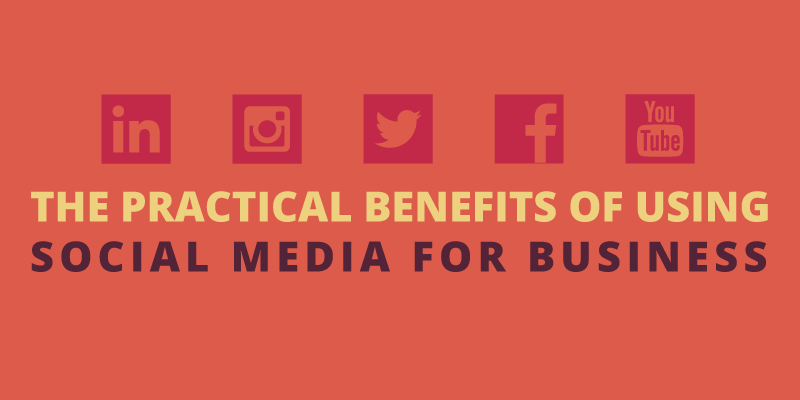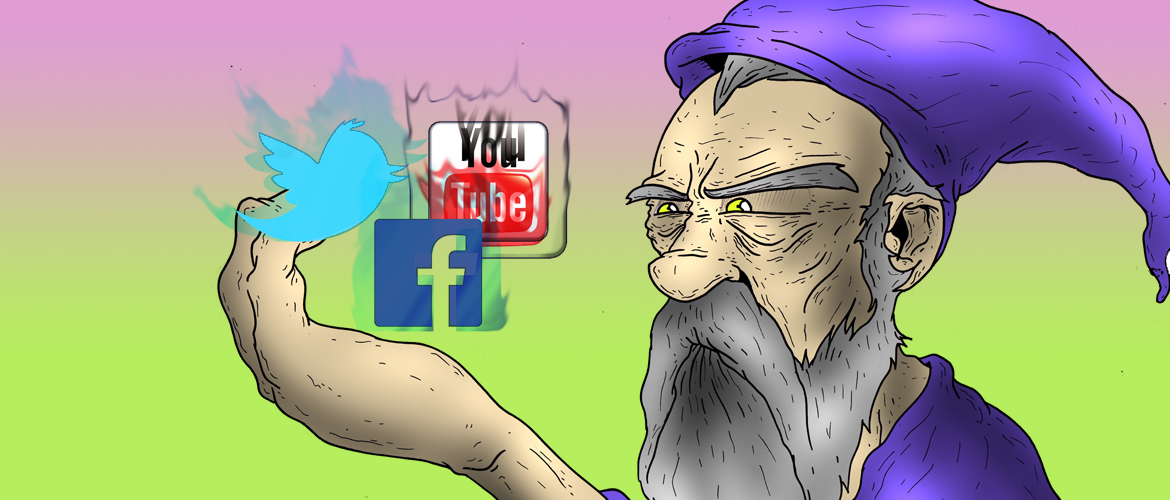Business is tough. It makes sense that you want to maximize the benefits of your work. The fact is, there simply isn’t enough time to spend on things that aren’t going to help your bottom line.
Yet, the questions come up a lot.
Are you on Twitter? What’s your Facebook page? You do have one, since everyone told you it was a good idea, but is it worth the trouble? What are the real benefits of using social media for business? It’s just something else to keep up with, right? Goodness knows, you probably already have enough on your plate.
Here’s the deal: there are real benefits of using social media for business and most businesses don’t spend the time to reap them.
 We’re talking real money here, too, not just pocket change. For instance, 97% of Lantern’s clients have acquired a client through their blog in the first month of working with us. According to Demand Metric, content marketing costs 62% less than traditional marketing and generates about three times as many leads. And businesses that engage their customers tend to have better customer service ratings. Buffer points out that “when companies engage and respond to customer service requests over social media, those customers end up spending 20% to 40% more with the company.”
We’re talking real money here, too, not just pocket change. For instance, 97% of Lantern’s clients have acquired a client through their blog in the first month of working with us. According to Demand Metric, content marketing costs 62% less than traditional marketing and generates about three times as many leads. And businesses that engage their customers tend to have better customer service ratings. Buffer points out that “when companies engage and respond to customer service requests over social media, those customers end up spending 20% to 40% more with the company.”
Let’s back up a minute, though. What is social media? Most definitions of social media relate to networks like Facebook, Twitter, Instagram, and even YouTube. In most cases, this is true. However, I’m using a more broad definition, to include your blog, and even your website.
Why? Because you have a lot of opportunity here to engage your customers with those tools. Granted, this is most likely going to be an indirect route, but in a competitive market, you need to take every chance you can to connect with your customers.
Your website and blog counts as social media
Websites are known for being static. They aren’t usually very interactive, but a well-crafted website will tell your customers what they want to know. This in itself should not be underrated. Our friends at Mequoda have written about the importance of your website as a communication tool, so I won’t go into it too much here.
What I will say is that websites are underutilized as a tool for social media. How? Simply adding your Facebook and Twitter feed to your website can help make it more interactive. Likewise, your latest blog post or two or three can appear on your site.
The relationship between your website and your social media should be complementary; don’t view them as separate entities. You want your traditional social media feeds to push people to your blog or website. Likewise, it should be easy to scoot from your website to traditional social media outlets for customers and future customers who may want to connect with you on a more personal level. In this way, your website is an indirect social media tool.
The same holds true for your blog. While your blog can be more directly interactive, it is more likely that your customers will communicate with you through Facebook or Twitter. That’s not to say your blog isn’t a good place to communicate. It’s actually a great place to share your personality, share your latest news, and advertise without advertising. You have more space to stretch out and it is an ideal spot to help your business get noticed by Google.
Show me the benefits
This is where some of the real benefits of social media for business begin to emerge. Your website, blog, and traditional social media outlets all begin to work in harmony to help you get recognized. They become your voice, speaking with people night and day, thanks to the marvels of software.
And don’t worry; you won’t run out of material. Your blog posts can magically turn into content for your feeds on Facebook, Twitter, LinkedIn, Google +, or pretty much any social media outlet you use.
Following our 12x12x12 social media strategy, you can keep your name in lights, or at least in front of your audience. And since you can schedule all your social media posts ahead of time, thanks to great companies like CoSchedule, it won’t even take too much time out of your daily routine. Remember the old advertising adage about how your ad needs to be seen six times before people remember you? Well, this is kind of like that, only easier.
When your website, blog, social media, and even your physical business is all interconnected and starts to groove, it ceases to be an additional task. Keeping up with a blog and monitoring your social media feeds is just part of business, just like tracking sales or balancing the books.
And when it comes to the benefits of using social media for business, you can get a lot, depending on your goals.
Get the benefits of blogging for your business
Blogging is an important social media tool for your business. And even though it doesn’t fall into the common definition of social media, I would propose that a blog is every bit as important as any other social media platform.
First things first. Your customers and future customers need to find you on the internet. If they can’t find you, you don’t exist – at least to them you don’t. At Lantern, we strongly believe that the best way to get found on the internet is through organic search. This means, among other things, that you aren’t paying to be found in a Google search, and… paying attention? This is a big one…
Ranking well in organic search means people can still find you long after any paid search results would be over.
[Tweet “Ranking in organic search means you can be found long after paid search is gone.”] Don’t get me wrong; I’m sure the customers you have now are great. You might even be lucky enough to have all the customers you want, but I don’t think so. Let’s be real; would you be reading a blog post about connecting with and attracting new customers if you already had an infinite supply? Perhaps. Maybe if I could write like Hunter S. Thompson or Jeanette Winterson you would.
Don’t get me wrong; I’m sure the customers you have now are great. You might even be lucky enough to have all the customers you want, but I don’t think so. Let’s be real; would you be reading a blog post about connecting with and attracting new customers if you already had an infinite supply? Perhaps. Maybe if I could write like Hunter S. Thompson or Jeanette Winterson you would.
For the rest of us, though, regular blog posts, with quality content will help get you and keep you ranking well in Google’s search engine. There is a process involved, and it takes some time, but you can find a lot of our clients who post regularly are doing quite well in organic searches. On average, our clients who publish 3x per week will increase their traffic by 3,100% in the first six months.
Traditional social media has benefits, too
We are proponents of using your blog posts as material for your social media feed. That’s part of what we do for our clients. But as a business, if you want to engage your audience (and you do, because that’s why they spend money with you) you have a fantastic opportunity to show them how great your customer service is, how spectacular your employees are, and how involved you are with your community.
There are numerous ways to do that. There are entire books that discuss social media strategy. I don’t have quite that much room, so let me share just a few with you. These are three benefits of using social media for business that I come across regularly in my work: Connections, Analytics, and Competition.
 Connections: Improving your ability to engage with customers.
Connections: Improving your ability to engage with customers.
Before I began working with Lantern, I ran the social media for a restaurant. We had a somewhat regular customer who had a bad experience with us. You’ve heard the saying that a happy customer tells one person, and an unhappy customer tells 10?
Well, she told 10, and many more, through Twitter. She Tweeted her displeasure, and tagged us, so anyone searching for us on Twitter would see her complaints. We didn’t realize she was unsatisfied with her experience until we, too, saw it on Twitter.
This could have gone a few different ways. It is far too often that a business becomes combative when a customer complains on a public forum. Don’t. Don’t. Don’t. Nothing good will come from you having a public argument with a customer.
People have bad days. We’ve all said things we regret later. Why should our customers be any different? Give them the benefit of the doubt. In this case, we could have easily written this off and ignored her, or worse, argued with her, but what is the point of that? You just look like a bully.
This is where the connection with your audience comes in. We wrote back to her as soon as we saw her Tweet, asked what happened, and invited her back for a meal on the house.
Guess what? She Tweeted about how happy she was with our customer service, and now very regularly tags us in her Tweets about how much she enjoys our food.
[Tweet “.@JimAlmo shares how dancing goats could be good for business.”] Analytics: Enabling you to find out how catchy your content is.
Analytics: Enabling you to find out how catchy your content is.
Analytics is one of the biggest things I’ve learned about while working at Lantern. It’s also the next step in creating connections. This is also where you can really notice the benefits of using social media for business.
Why? Analytics give you customer insights. Facebook offers free analytics that reveal when your followers are online, where they’re from, and even how often they engage with you. You can also find out if people are blocking you, or unfollowing you. Some of this should be expected. You can’t gain a good following without losing a few folks along the way.
However, if your analytics show that you are regularly losing followers, you may want to reconsider your strategy.
Twitter offers similar analytics. Which of your Tweets got retweeted the most, or received the most engagement? How far did your Tweet reach beyond your immediate audience?
Once you have this information, what do you do with it? It’s true the web is 24/7, but your audience might be most active, say, between 6 and 8 p.m. on weekdays. They may respond most frequently to posts with pictures or videos, or maybe they really enjoy the things you choose to share.
Most importantly: analytics can tell you when you’ve written a good headline, or a good description, or you’ve picked a great featured photo—because the content gets liked, shared, retweeted and passed around.
I’ll give you another example:
Facebook is tricky. Their system is set up so that the number of people who see your post is based on the amount of engagement for your previous posts. In other words, if a lot of people like, comment, or share a post, then Facebook will deliver your next post to a larger portion of your followers. The flip side, of course, is that a few dud posts, and even your good content will not make it to many eyes.
One coffee shop I’ve worked with has a fan base that particularly likes two things: mentions of their city, and cute animal videos. Using that information, I shared an article from a national magazine that had a lot of good things to say about the business’ hometown. Within a few hours, about 2/3 of their followers, over 2,500 people, had seen this post. It received 49 likes, 13 shares, and 198 post clicks.
Another post – a video of a dancing goat – received 30 likes, comments, and shares, and reached over 1,400 people. A dancing goat has absolutely nothing to do with the business, but that post mattered, and here’s why.
The posts following these “blockbusters” reached, in some cases, up to 300% more people than some of the low engagement posts. So no, you probably aren’t selling dancing goats, but that video could help you reach your customers. Heck, maybe they need a break from the monotony of your self-promotion. And knowing that your customers like dancing goats tells me that a few dancing goat videos will help you reach more customers with whatever it is you ARE selling. Also, if your fans don’t like videos of dancing goats, they’ll let you know. They won’t click, they won’t like, and they won’t share.
It’s all in the analytics.
[Tweet “300% more visibility on FB after a dancing goat video? Yep!”] Competition: Discovering and partnering up with competitors.
Competition: Discovering and partnering up with competitors.
Ok, so monitoring your competition takes a bit more work, but can add to the benefits of using social media for business. In some ways, it’s really no different than the old days of visiting your competition’s business to find out what they are doing.
Only, in this case, you can find this out without leaving your desk. Check out what they have going on in social media. Do they have an interactive group of followers? If so, what are they doing that you aren’t?
One caveat with competition – in the online world, there really is enough business to go around. I am using the word competition rather loosely. “Friendly competition” might be more accurate. In fact, one great way to engage people is to applaud your competitors when they share special moments.
That goes a long way in creating a positive image of your business, and it’s just a nice thing to do.
Of course, if you feel like you need help with social media, or blogging, and getting the benefits of using social media for business, feel free to get in touch with us. Until then, have fun, and don’t be afraid of being social online. It really is no different than talking to someone in person.
Do you use social media for your business? What benefits have you found? Let us know in the comments.




